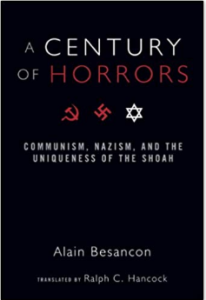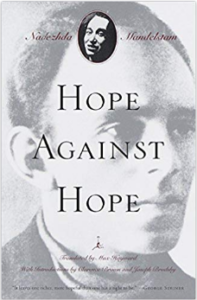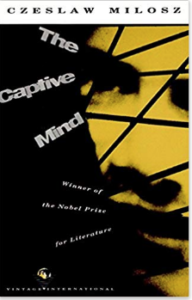 I know that you’re supposed to take up some frivolous books for the summer, but perhaps influenced by the morning and evening fog that characterizes coastal California, my reading has been more dour. I mentioned these books in an earlier post: A Century of Horrors, by Alain Besançon, Hope Against Hope, by Osip Mandelstam’s wife, Nadezhda, and most of Secondhand Time (I couldn’t get through all of it), by Svetlana Alexievich. I also just reread Czesław Miłosz’ The Captive Mind. All of these books deal with the phenomenon of Communism as it has been practiced since the Russian Revolution. Besançon’s thesis is that while Nazism was horrific, it was a brief nightmare compared to Communism. The Shoah was intense, killed millions, but was defeated and rejected.
I know that you’re supposed to take up some frivolous books for the summer, but perhaps influenced by the morning and evening fog that characterizes coastal California, my reading has been more dour. I mentioned these books in an earlier post: A Century of Horrors, by Alain Besançon, Hope Against Hope, by Osip Mandelstam’s wife, Nadezhda, and most of Secondhand Time (I couldn’t get through all of it), by Svetlana Alexievich. I also just reread Czesław Miłosz’ The Captive Mind. All of these books deal with the phenomenon of Communism as it has been practiced since the Russian Revolution. Besançon’s thesis is that while Nazism was horrific, it was a brief nightmare compared to Communism. The Shoah was intense, killed millions, but was defeated and rejected.
Communism, on the other hand, while originating in an idealistic set of premises, has for over a century imprisoned, murdered, and instilled terror in many more millions, and is still doing so. It’s a powerful book, and lays out facts in a reasoned argument that’s hard to deny.
 Hope Against Hope, is a memoir of specifically how the Stalinist regime and the terror of the thirties affected the most important Russian writers of the time: the daily dread and uncertainty, the informers and camps, the arrests and deportations. It’s poignant and appalling.
Hope Against Hope, is a memoir of specifically how the Stalinist regime and the terror of the thirties affected the most important Russian writers of the time: the daily dread and uncertainty, the informers and camps, the arrests and deportations. It’s poignant and appalling.
Miłosz’ book details his personal experience during and after the war, as a Polish-speaking Lithuanian, living in Warsaw, and after the war in Warsaw, Paris, and the US. His indictment of the Soviet regime as it spread from “the Center” into the satellite countries, is personal.

He talks about how people trying to adapt to the new regime must practice the art of falsity, which he terms”Ketman,” a term from ancient Persia, an intricate game of saying one thing while thinking another, of keeping up a front. This consistent front eventually takes over, so there is no ability to think uncensored thoughts.
He details how this affected him and his writing, how it affected other writers, and his mourning for the loss of the beautiful Baltic States, the fields and trees and smells of his youth, whose people and landscapes were decimated by the Soviets.
Reading these books interspersed with Secondhand Time, was a bit schizophrenic, as this book is largely interviews of contemporary citizens of Russia after the collapse of the Soviet Union.
Many of them still believe in the ideals they suffered for–went hungry, were imprisoned, lost children or husbands.  They long for the State that doesn’t exist, that has been sold for a pair of blue jeans. Unlike Miłosz and Mandelstam, they don’t see through the illusion, they pine for it.
They long for the State that doesn’t exist, that has been sold for a pair of blue jeans. Unlike Miłosz and Mandelstam, they don’t see through the illusion, they pine for it.
In any case, it’s been an interesting month of nonfiction for someone who rarely reads anything but novels, and has sparked many passionate dinner conversations.